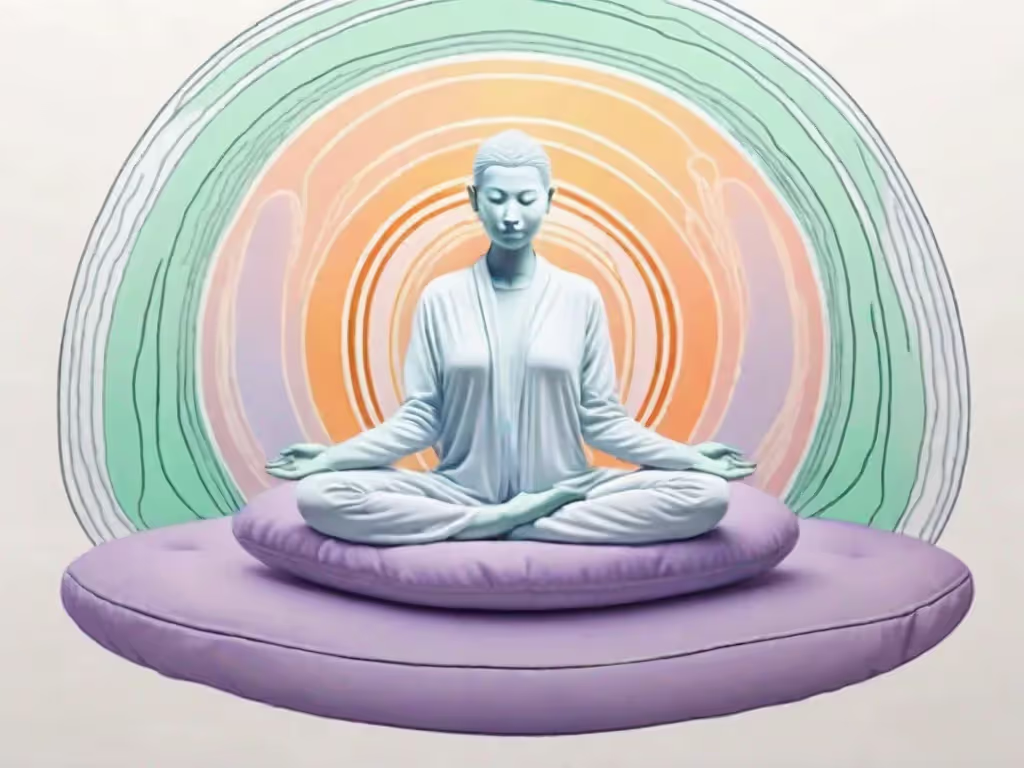When the world quiets down and darkness falls, a unique opportunity arises. A time for reflection, relaxation, and personal growth. You've guessed it—it's nighttime meditation. This practice holds immense potential for those wanting to enhance their wellbeing and harness the calmness of the night.
Understanding Meditation and Its Importance
Meditation is no longer an esoteric practice saved for spiritual gurus and monks in Himalayan hideaways. It has found its way into our modern livelihoods, celebrated for its wealth of benefits in the realms of physical and mental health. Let us delve deeper into understanding what meditation is and unravel the science that confirms its many praises.
But before we dive into the details, let's take a moment to imagine a serene setting - a peaceful garden with lush greenery and the gentle sound of a trickling stream. This is the kind of calm and tranquility that meditation aims to bring into our lives.
What is Meditation?
Meditation is a mental exercise that involves relaxation, focus, and awareness. It's like a gym workout for your brain, bolstering mental resilience and emotional stability. Just as physical exercise strengthens our muscles, meditation strengthens our mind.
When you meditate, you create a space for stillness and silence within yourself. It is a time to let go of the constant chatter of the mind and be fully present in the moment. By doing so, you cultivate a sense of inner peace and clarity.
There is no right or wrong way to meditate. The true power of meditation lies in its adaptability, individuality, and mindfulness. Whether you choose to sit in silence, focus on your breath, or engage in guided meditation, the goal is to quiet the mind and connect with your inner self.
The Science Behind Meditation
Medical and scientific studies have provided compelling evidence on the impact of meditation on the human brain. The brain is a complex organ, and meditation has been shown to have a profound effect on its structure and function.
Regular practice of meditation has been found to improve grey matter density in key areas of the brain. These areas are associated with memory, empathy, and decision-making. As a result, individuals who meditate often experience improved cognitive abilities and emotional intelligence.
Furthermore, meditation has been shown to decrease anxiety by regulating stress hormones such as cortisol. It activates the body's relaxation response, reducing the fight-or-flight response that can often lead to chronic stress and anxiety. By calming the mind and body, meditation allows us to find a sense of peace and tranquility in the midst of our busy lives.
In addition to reducing anxiety, meditation enhances focus and attention. It trains the attentional networks in the brain, allowing us to concentrate better and improve our productivity. With regular practice, we become more present and engaged in our daily activities, leading to a greater sense of fulfillment and satisfaction.
In essence, the science paints a picture of meditation as a powerful tool for healing, resilience, and overall well-being. It is not just a practice reserved for the spiritually inclined; it is a practice that can benefit anyone seeking to cultivate inner peace, reduce stress, and enhance their overall quality of life.
Aura has the world’s largest and best collection of Meditations and hundreds of Coaches to choose from.
Try it Free!
The Advantages of Meditating at Night
While meditation at any time can be beneficial, there's something uniquely advantageous about nightly practice. It adds a tranquil ending to your day, acting as a natural transition between the day's activities and the rejuvenating potential of the night.
When you engage in meditation at night, you create a sacred space for yourself to let go of the events of the day. As you sit in stillness, you allow your mind and body to unwind, releasing any tension or worries that may have accumulated throughout the day. This intentional act of self-care sets the stage for a peaceful and restful night's sleep.
Improved Sleep Quality
A clear benefit of nighttime meditation is its impact on sleep. By calming the mind, meditation can aid sleep initiation and enhance sleep quality. Regular practitioners often report fewer sleep interruptions, leading to higher quality and quantity of restorative sleep.
As you delve deeper into your meditation practice, you may find that your ability to relax and let go of racing thoughts improves. This newfound sense of tranquility can help you fall asleep faster and experience a deeper state of relaxation throughout the night. The practice of meditation also helps regulate the production of stress hormones, such as cortisol, which can disrupt sleep patterns. By reducing stress levels, meditation promotes a more peaceful and uninterrupted sleep.
Stress Reduction and Relaxation
Nothing puts the mind at ease like meditation. By focusing your attention away from stress-inducing thoughts, nighttime meditation helps you unwind, creating a refreshing break from daily stresses. Over time, this reduces your overall stress levels, translating to better mental health.
During your nighttime meditation practice, you give yourself permission to let go of the pressures and demands of the day. As you sit in stillness, you cultivate a sense of inner peace and tranquility. This state of relaxation not only benefits your mental well-being but also has a positive impact on your physical health. Studies have shown that regular meditation practice can lower blood pressure, reduce inflammation, and boost the immune system.
Enhanced Creativity and Problem-Solving Skills
Meditating at night can stimulate your creative powers and enhance problem-solving skills. When the mind is calm, it fosters an environment conducive to innovative thinking. Solutions to problems can seem to magically appear during or after a meditative session.
As you enter the meditative state, your brain waves shift into a more relaxed and focused state. This altered state of consciousness allows you to tap into your subconscious mind, where creativity and intuition reside. By accessing this deeper level of awareness, you may find yourself experiencing moments of inspiration and clarity. Ideas flow effortlessly, and solutions to challenges present themselves with ease.
Moreover, meditation cultivates a sense of mindfulness, which is the practice of being fully present in the moment. This heightened awareness can help you approach problems from a fresh perspective, enabling you to see new possibilities and overcome obstacles more effectively.
How to Incorporate Nighttime Meditation into Your Routine
Once you understand the transformative potential of nighttime meditation, the next step is to incorporate it into your routine. This step can be seamless and enjoyable, as long as you follow some useful tips.
Nighttime meditation has been proven to have numerous benefits for both the mind and body. It helps reduce stress, improve sleep quality, enhance focus and concentration, and promote overall well-being. By including nighttime meditation in your daily routine, you can experience these positive effects and cultivate a sense of inner peace and tranquility.
Choosing the Right Time and Place
Choosing the right time and place for your nighttime meditation practice is crucial to creating a peaceful and uninterrupted environment. It is essential to select a quiet and comfortable spot where you're least likely to be disturbed. This could be a dedicated meditation space in your home or simply a corner of your bedroom.
When it comes to the timing of your meditation practice, it is important to consider what suits your lifestyle best. Some individuals find that meditating immediately before bed helps them relax and unwind from the day's activities, while others prefer to meditate an hour earlier to ensure they are fully awake and focused during their practice.
Experiment with different times and places to find what works best for you. Remember, the goal is to create a serene and peaceful environment that allows you to fully immerse yourself in your meditation practice.
Selecting a Meditation Technique
With a dizzying array of meditation techniques available, it can be overwhelming to choose the right one for your nighttime practice. However, the key is to select a technique that resonates with you and aligns with your goals and preferences.
Mindfulness meditation is a popular choice for many individuals. It involves focusing your attention on the present moment, observing your thoughts and emotions without judgment. This technique can help cultivate a sense of awareness and acceptance, allowing you to let go of stress and worries before bedtime.
Guided imagery is another effective technique that involves visualizing peaceful and calming scenes. By using your imagination, you can transport yourself to a serene beach or a tranquil forest, creating a sense of relaxation and tranquility.
Yoga nidra, also known as yogic sleep, is a deep relaxation technique that involves lying down and following a guided meditation. This technique can help release tension from the body and promote a restful night's sleep.
Explore different meditation techniques and find one or more that resonate with you. Remember, there is no right or wrong technique – the most important thing is to find a practice that brings you joy and helps you connect with your inner self.
Creating a Consistent Meditation Schedule
Consistency is key when it comes to reaping the full benefits of nighttime meditation. Creating a consistent meditation schedule helps build the habit, making it second nature over time.
Start by setting aside a specific time each day for your meditation practice. It could be as little as five minutes or as long as an hour – the duration doesn't matter as much as the regularity. By committing to a consistent schedule, you are more likely to stick to your practice and experience the transformative effects of meditation.
Consider integrating your nighttime meditation practice into your bedtime routine. This can help signal to your body and mind that it's time to relax and prepare for sleep. You can also try incorporating meditation breaks throughout your day to maintain a sense of calm and balance.
Remember, even a few minutes of meditation per day can have profound effects if regularly practiced. Be patient with yourself and allow your practice to evolve naturally. With time and dedication, nighttime meditation can become a cherished part of your routine, bringing you peace and serenity.
Common Challenges in Nighttime Meditation and How to Overcome Them
Like any new habit, nighttime meditation comes with its unique set of challenges. However, with patience and a bit of guidance, you can easily overcome them.
Dealing with Distractions
Distractions, external or internal, are a common obstacle in meditation. Rather than resisting them, train yourself to acknowledge and allow them to pass without engagement. With practice, you‘ll find it easier to sustain focus.
Overcoming Sleepiness During Meditation
It's common to feel sleepiness during nighttime meditation. Posture can play a crucial role here. Adopt a position that keeps you alert while remaining comfortable. With time, your body's internal clock will adapt.
Managing Expectations and Frustrations
Lastly, manage your expectations. Don't get frustrated if you do not see immediate results, as meditation benefits unfold over time. Embrace the process rather than rushing towards an outcome.
To end on a practical note, consider utilizing the Aura Health app to kickstart or complement your nighttime meditation routine. Its personalized meditation practices, lifetime tracking, and ease-of-use make it an invaluable resource for any enthusiastic meditator. Remember: Every night holds the potential for renewal and rejuvenation, all you have to do is tap into it. Unlock tranquility, discover enlightenment, and reclaim your nights with meditation.
Aura is Your All In One App for Meditation, Mindfulness Wellbeing
Find peace every day with one app for your whole well-being. There is no one-size-fits-all solution to mental well-being. Aura is the first all-in-one wellness app that learns how to best help you. Discover an endless library of expert-created tracks for your well-being, all taught by the world’s best coaches, therapists, and storytellers. With Aura's personalized recommendations, you can find peace every morning, day and night.



.webp)






.avif)

%20(1).avif)


.avif)
.avif)
.webp)


.avif)


















































































































.avif)

















.svg)









